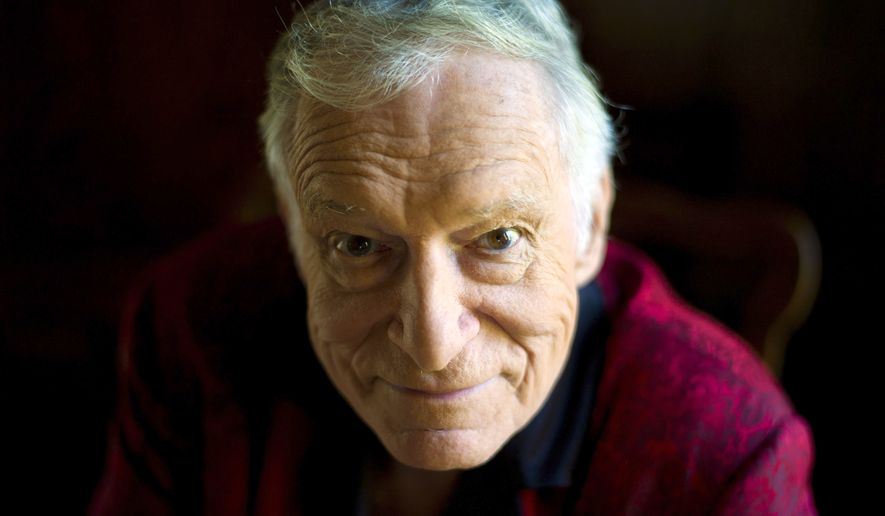Hugh Hefner, the man who made “Playboy” a household word, died Wednesday of natural causes, according to the magazine he founded. He was 91.
He died surrounded by loved ones at his iconic Playboy Mansion in Los Angeles, a temple to the lifestyle he had exemplified and had normalized since his 1953 first issue published naked photos of America’s biggest movie star (Marilyn Monroe).
Several celebrities expressed condolences Thursday.
“Hef changed my life. He made me the person I am today. I couldn’t be more thankful for our friendship and our time together. I will miss him so much but he will be in my heart forever,” former Hefner girlfriend and Playboy model Kendra Wilkinson said in a statement.
“RIP #Hef Thank you for being a revolutionary and changing so many people’s lives, especially mine. I hope I made you proud,” TV personality and former Playboy model Jenny McCarthy said on Twitter.
“RIP to the legendary Hugh Hefner! I’m so honored to have been a part of the Playboy team! You will be greatly missed! Love you Hef! Xoxo,” reality TV star Kim Kardashian tweeted.
PHOTOS: Celebrity deaths in 2017: The famous faces we've lost
Mr. Hefner and his magazine were widely credited/blamed — indeed, he even boasted of it — with doing more to make pornography mainstream than any other institution, prompting a generation of men to joke about “buying Playboy for the articles” rather than for naked pictures of women.
Jokes aside, the magazine did frequently give over major space to in-depth interviews with major newsmakers and artistic and cultural figures, ranging from conservative radio host Rush Limbaugh to film director Stanley Kubrick. The magazine also published fiction by such canonical authors as Ray Bradbury, John Updike and Vladimir Nabokov.
Perhaps the biggest such interview came in the November 1976 issue with Jimmy Carter, then the Democratic presidential nominee. In the interview’s most famous exchange, Mr. Carter was asked whether he’d ever committed adultery.
Mr. Carter replied that he’d “looked on a lot of women with lust. I’ve committed adultery in my heart many times.”
Mr. Hefner made his living and his fame mocking and undermining such “puritanical” attitudes on sex. He claimed to have had sexual intercourse with more than a thousand women, including many of his models.
“I changed attitudes toward sex: That nice people can live together now. That I decontaminated the notion of premarital sex. That gives me great satisfaction,” Mr. Hefner said in a 1992 interview with The New York Times.
He founded the magazine on the eve of the Sexual Revolution and normalized the nudity by selling it as part of a “playboy lifestyle.”
Wielding a cocktail glass, holding a pipe in his hands or mouth and clad in a silk smoking jacket, Mr. Hefner portrayed the persona of the wealthy man who has the best of everything — including the sexiest of women.
There was the Playboy Mansion, first in Chicago and later in Los Angeles, which was used for events ranging from Hollywood star parties and Rolling Stones concerts to professional fight cards. The magazine invited — and received — advertisements and lifestyle articles for every manner of high-end consumer goods.
There were the Playboy Clubs, featuring the “bunnies” — buxom, scantily clad women with rabbit ears and fluffy white cottontails. Hefner’s private jet — a McDonnell Douglas DC-9 — was dubbed “The Big Bunny” and had a giant bunny decorating its tail.
Like the magazine, the clubs featured plenty of legitimate entertainment. According to The Associated Press, comedians such as George Carlin, Rich Little, Mark Russell, Dick Gregory and Redd Foxx appeared at them.
But the last closed in 1988 — partially a victim of a general decline in supper clubs and nightclubs. Mr. Hefner acknowledging them as “passe” and “too tame for the times.”
Feminist icon Gloria Steinem worked undercover as a bunny in one of them, however, and her article “A Bunny’s Tale” became a key early-’60s feminist text.
Ms. Steinem described the bunnies’ dashed promises and degrading treatment. “Here bunny, bunny, bunny!” one guard called out to her; she overheard another bunny saying a customer is ‘a real gentleman. He treats you just the same whether you’ve slept with him or not.’”
One such customer throughout the decades was comedian Bill Cosby, a friend of Mr. Hefner’s. Several of the women who have accused Mr. Cosby in recent years of drugging and raping them were bunnies, including Chloe Goins, who sued Mr. Hefner as well as Mr. Cosby.
In 2014 Mr. Hefner issued a statement on the Cosby charges saying he “would never tolerate this behavior.”
Years after her article, Ms. Steinem said, “I think Hefner himself wants to go down in history as a person of sophistication and glamour. But the last person I would want to go down in history as is Hugh Hefner.”
⦁ This article was based in part on wire service reports.
• Victor Morton can be reached at vmorton@washingtontimes.com.




Please read our comment policy before commenting.